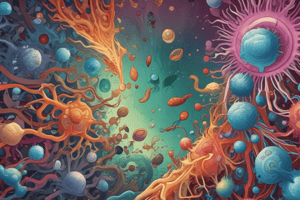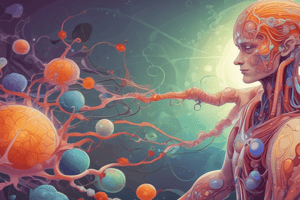Podcast
Questions and Answers
Which type of immunity is inherent to a species and not acquired through any other means?
Which type of immunity is inherent to a species and not acquired through any other means?
- Species resistance (correct)
- Artificially acquired active
- Naturally acquired active
- Artificially acquired passive
Which type of immunity results from having an infectious disease?
Which type of immunity results from having an infectious disease?
- Naturally acquired passive
- Artificially acquired passive
- Artificially acquired active
- Naturally acquired active (correct)
What type of medication is commonly used to treat allergies?
What type of medication is commonly used to treat allergies?
- Analgesics
- Pain relievers
- Anti-emetics
- Antihistamines (correct)
What is an excessive immune response that involves IgE antibodies?
What is an excessive immune response that involves IgE antibodies?
What is a life-threatening event that causes a rapid drop in blood pressure?
What is a life-threatening event that causes a rapid drop in blood pressure?
What is used to rescue a person experiencing anaphylaxis?
What is used to rescue a person experiencing anaphylaxis?
What determines how far cancer cells have spread?
What determines how far cancer cells have spread?
What stage of breast cancer has Elisa been diagnosed with?
What stage of breast cancer has Elisa been diagnosed with?
What are substances that join to proteins in the blood to trigger an immune response?
What are substances that join to proteins in the blood to trigger an immune response?
What is the fluid called that exists between cells and is destined to become lymph?
What is the fluid called that exists between cells and is destined to become lymph?
What is the blockage of lymphatic vessels that drain excess fluids from the body called?
What is the blockage of lymphatic vessels that drain excess fluids from the body called?
What are T cells responding to antigens by secreting?
What are T cells responding to antigens by secreting?
What acts as a chemical barrier and destroys pathogens on the surface of the eye in tears?
What acts as a chemical barrier and destroys pathogens on the surface of the eye in tears?
What are cytokines that assist in regulation of the immune response by increasing B cell production?
What are cytokines that assist in regulation of the immune response by increasing B cell production?
What is a highly contagious viral infection spread through the saliva of the infected person and frequently affects teenagers?
What is a highly contagious viral infection spread through the saliva of the infected person and frequently affects teenagers?
What is the nonspecific body defense mechanism in which monocytes leave the bloodstream and become macrophages to attack pathogens in other tissues?
What is the nonspecific body defense mechanism in which monocytes leave the bloodstream and become macrophages to attack pathogens in other tissues?
What is the best response to Elisa's question about the seriousness of her breast cancer?
What is the best response to Elisa's question about the seriousness of her breast cancer?
What is a factor that causes the formation of cancer?
What is a factor that causes the formation of cancer?
Which of the following is NOT a sign or symptom of systemic lupus erythematosus?
Which of the following is NOT a sign or symptom of systemic lupus erythematosus?
What are signs or symptoms of chronic fatigue syndrome?
What are signs or symptoms of chronic fatigue syndrome?
Which of the following actions causes lymph to flow through the lymphatic vessels?
Which of the following actions causes lymph to flow through the lymphatic vessels?
What happens if lymph cannot be pushed through the vessels?
What happens if lymph cannot be pushed through the vessels?
What is a function of the spleen?
What is a function of the spleen?
What is a characteristic of the spleen?
What is a characteristic of the spleen?
What is the term for a life-threatening condition caused by an allergy in which vessels dilate so quickly that blood pressure drops too quickly for organs to adjust?
What is the term for a life-threatening condition caused by an allergy in which vessels dilate so quickly that blood pressure drops too quickly for organs to adjust?
Which type of cells primarily target cancer cells, killing them by secreting chemicals that produce holes in their membranes?
Which type of cells primarily target cancer cells, killing them by secreting chemicals that produce holes in their membranes?
What is the term for proteins produced by the cells of the lymphatic system that assist in immune response regulation?
What is the term for proteins produced by the cells of the lymphatic system that assist in immune response regulation?
What is the term for masses of lymphoid tissue distributed in the connective tissue of mucosa?
What is the term for masses of lymphoid tissue distributed in the connective tissue of mucosa?
What is the main function of the palatine?
What is the main function of the palatine?
Which enzyme, which breaks down carbohydrates, is contained in saliva?
Which enzyme, which breaks down carbohydrates, is contained in saliva?
What is the main function of the epiglottis?
What is the main function of the epiglottis?
What is the esophageal hiatus?
What is the esophageal hiatus?
What part of the esophagus connects to the pharynx?
What part of the esophagus connects to the pharynx?
What is the primary function of the gallbladder?
What is the primary function of the gallbladder?
Which layer of the alimentary canal wall moves materials through the canal?
Which layer of the alimentary canal wall moves materials through the canal?
Which layer of the alimentary canal wall absorbs nutrients?
Which layer of the alimentary canal wall absorbs nutrients?
Which layer of the alimentary canal wall has blood vessels that carry nutrients away?
Which layer of the alimentary canal wall has blood vessels that carry nutrients away?
What is the function of the serosa?
What is the function of the serosa?
Which organ of the digestive system begins the chemical breakdown of foods?
Which organ of the digestive system begins the chemical breakdown of foods?
Which organ of the digestive system connects the mouth and esophagus?
Which organ of the digestive system connects the mouth and esophagus?
Flashcards are hidden until you start studying
Study Notes
Immunity
- Species resistance is a type of immunity that results from being human, as opposed to being a cow or plant.
- Naturally acquired active immunity results from having an infectious disease.
- Artificially acquired active immunity results from a vaccine.
- Artificially acquired passive immunity results from a vaccine or antibody injection.
- Naturally acquired passive immunity results from receiving antibodies from mother to child.
Allergies
- Allergies can be treated effectively by antihistamines.
- Anaphylaxis is an excessive immune response that involves IgE antibodies and causes a rapid drop in blood pressure, which is a life-threatening event.
- Epinephrine is used to rescue a person experiencing anaphylaxis.
Cancer
- Staging is used to identify how far cancer cells have spread.
- In stage II breast cancer, the cancer cells have not spread beyond the breast.
Carcinogens
- A carcinogen is any factor that causes the formation of cancer.
Systemic Lupus Erythematosus
- Numbness of fingers and toes, tender lymph nodes in the neck, "butterfly" rash, and renal failure are signs or symptoms of systemic lupus erythematosus.
Chronic Fatigue Syndrome
- Tender lymph nodes and joint pain are signs or symptoms of chronic fatigue syndrome.
Lymphatic System
- The contraction of the muscles in vessel walls and the squeezing action of the skeletal muscles cause lymph to flow through the lymphatic vessels.
- If lymph cannot be pushed through the vessels, edema develops.
- The spleen removes aged RBCs from circulation.
- The spleen is located in the thorax, above the heart.
Immune Response
- Hapten is a substance that joins to proteins in the blood to trigger an immune response.
- Interferon acts as a chemical barrier and blocks viruses from infecting cells.
- Cytokines known as interleukins assist in regulation of the immune response by increasing B cell production and stimulating red bone marrow to produce more white blood cells.
- Monokines and lymphokines are proteins that assist in immune response regulation.
Other Immune-Related Concepts
- A pathogen is a disease-causing agent such as a bacterium, virus, toxin, fungus, or protozoan.
- An antigen is a foreign substance in the body that triggers an immune response.
- Allergen is a substance that triggers an allergic response.
- Inflammation can result from an injury or infection, causing blood vessels in the injured area to dilate and become leaky.
Other Health-Related Concepts
- Celiac disease is an immune reaction linked to eating gluten that triggers a reaction causing the body to attack the small intestinal mucosa.
- MALT (mucosa-associated lymphoid tissue) includes pharyngeal, palatine, and lingual tonsils.
- The palatine's main function is to separate the oral and nasal cavities.
- The main function of the epiglottis is to cover the opening of the larynx.
- The esophageal hiatus is the hole in the diaphragm that the esophagus goes through.
- The gallbladder's only function is to release bile in response to the hormone cholecystokinin.
Digestive System
- The muscular layer of the alimentary canal wall contracts to move materials through the canal.
- The mucosa, the innermost layer of the alimentary canal wall, absorbs nutrients.
- The submucosa layer of the alimentary canal wall has blood vessels that carry nutrients away.
- The serosa layer of the alimentary canal wall secretes serous fluid to keep other organs from sticking to the structures of the alimentary canal.
- The mouth is the organ of the digestive system that begins the chemical breakdown of foods.
Studying That Suits You
Use AI to generate personalized quizzes and flashcards to suit your learning preferences.



